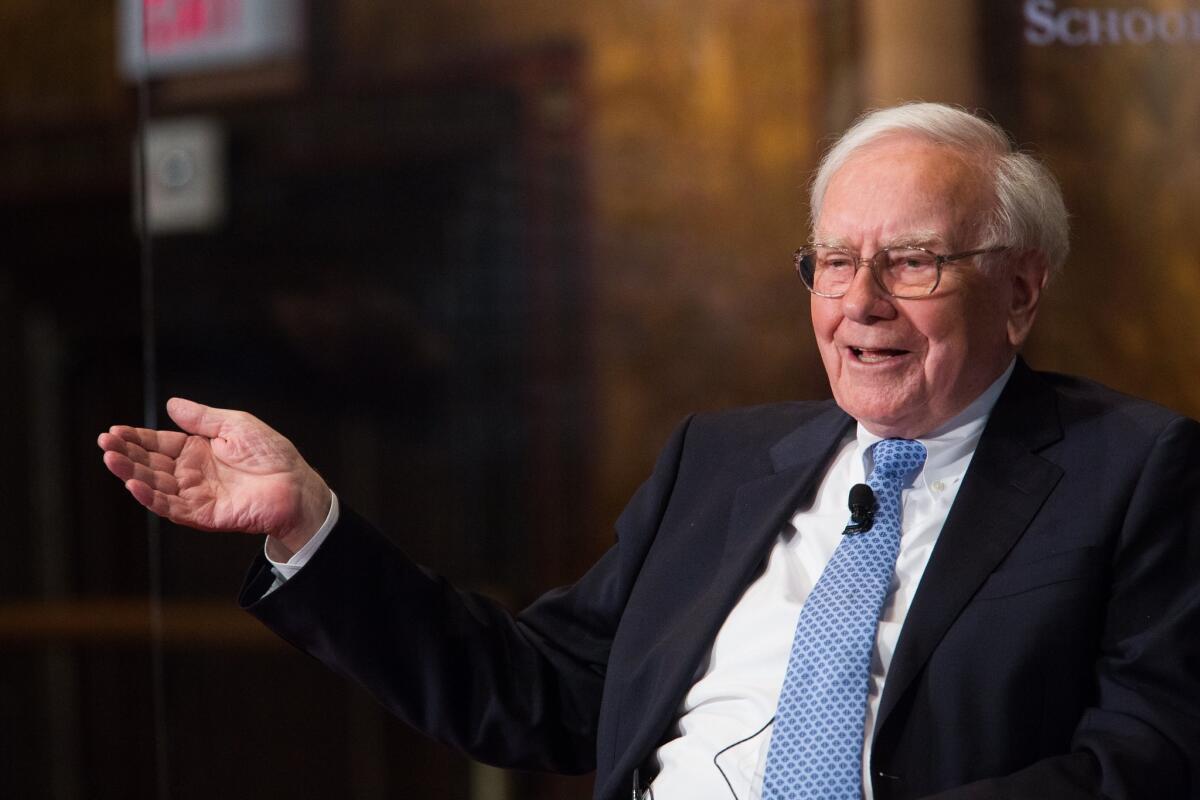Column: Smart billionaires buy when everyone else is selling: Buffett and Soros edition

Warren Buffett: What does he know that you don’t know?
If the old investing adage is true that “the time to buy is when blood is running in the streets,” then the time to buy into oil is now. The blood of oil investors is running thick indeed in the markets, so the smart thing to do may be to buy.
At least that seems to be the thinking of master investors Warren Buffett, George Soros and David Tepper, all of whom have just disclosed stakes in the Houston pipeline company Kinder Morgan. Buffett’s stake of 26.5 million shares, valued originally at $396 million, was disclosed in a public filing Tuesday. Kinder Morgan jumped by about 10% to $17.35 in morning trading on Wall Street on Wednesday, giving Buffett a paper profit of about $60 million. Until the recovery, the share price had fallen by about two-thirds in a year.
Soros, who has been taking a generally bearish approach to the oil patch, has disclosed a Kinder Morgan stake of 50,700 shares, worth now about $887,000. Hedge fund manager Tepper’s disclosed holding is about 9.5 million shares, worth about $163 million as I write on Wednesday. None of them hold a commanding stake in the company: Buffett’s shares come to about 1.2% of the total outstanding and only about one-third of a percent of the $130-billion portfolio of his Berkshire Hathaway holding company.
Two contrarian lines of thought probably motivate these investors’ actions, both based on the idea that when the mob is running in one direction, the smart investor runs the other way. One is that with oil trading near a 12-year low, the commodity is likely to be closer to the bottom of its price cycle than the top.
The advice offered by Andrew Tobias in his classic book “The Only Investment Guide You’ll Ever Need” is useful here: “Ask yourself which would be more of a surprise: good news or bad news. News that is expected never has as much impact -- if any at all -- as news that is unexpected.” With oil, news pointing to a bottoming or an upturn would be very surprising, so by Tobias’ lights, that’s the way to bet.
The second line of thought is that, whatever the direction of oil prices, Kinder Morgan has been unfairly punished. This is the notion offered by the company’s executives, who argue that the market is making a mistake by valuing Kinder Morgan shares in tandem with oil prices, as has been the case throughout 2015. Kinder Morgan bills itself as the largest energy infrastructure company in North America, but oil production generated only 10% of its earnings before depreciation and amortization, the company says (see the slide below from a recent investor presentation). The rest is from natural gas, a segment where business is strong.
That may be true, but there’s hardly any question that the company has been hurt by the slide in oil prices and in its shares. Kinder Morgan cut its dividend by 75% in December to save cash. The company’s profits slid 91% to $208 million last year, on revenue of $14.4 billion, hurt by a heavy debt load.
It’s proper to observe that the idea that pipeline companies are largely immune from the oil price declines has come into question over the last year. That’s the period in which master limited partnerships, which are bets on oil infrastructure and were therefore deemed “can’t miss” investments despite their exposure to the oil industry, got slaughtered.
Kinder Morgan itself was an MLP until it restructured in 2014 as a conventional corporation. That makes it a cleaner holding in tax terms, possibly enhancing its allure to big investors such as Buffett and Soros. If investors start to buy into the argument that the company’s fortunes are independent of oil prices, or if oil prices recover, or both, the story on Kinder Morgan may change and Buffett, Soros and Tepper can boast of having been there first.
Whether they’re pointing the way for the average investor is an open question. Buffett and his ilk have resources allowing them to survive a wrong bet, or to hang in for as long as it takes until things genuinely turn around. But their long-term records make it hard to fault their approach.
Keep up to date with Michael Hiltzik. Follow @hiltzikm on Twitter, see our Facebook page, or email michael.hiltzik@latimes.com
More to Read
Inside the business of entertainment
The Wide Shot brings you news, analysis and insights on everything from streaming wars to production — and what it all means for the future.
You may occasionally receive promotional content from the Los Angeles Times.










